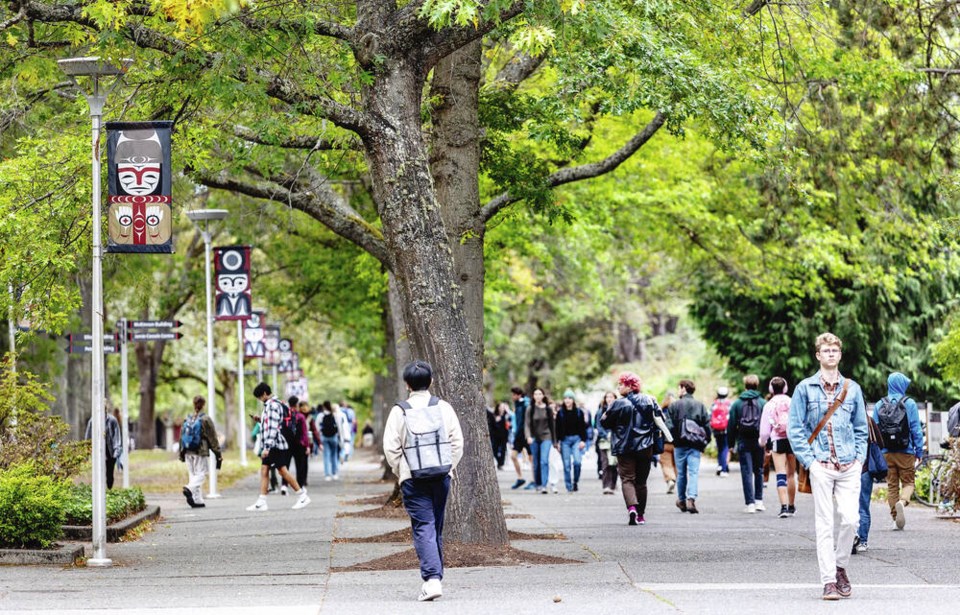The University of Victoria is joining the ranks of a growing number of Canadian post-secondary institutions that are adopting AI tools to enhance learning.
UVic’s learning and teaching innovation department announced that it would begin piloting a generative AI tool in three lower-level undergraduate courses this fall, a week before classes begin.
Students attending an entry-level 100-course on “learning strategies for university success,” a second-year business course on organizational behaviour, and its equivalent offering in the School of Health and Information Sciences will have free access to Studiosity, an academic writing feedback tool that touts itself as an ethical “AI for learning.”
The department’s executive director, Shailoo Bedi, was not available for an interview about the new tool.
In a statement, Bedi said the university, which does not have a ban on generative-AI tools, is “thoughtfully” engaging with AI technologies and is supporting students and professors in the ethical and appropriate use of AI in learning and teaching.
Studiosity promotional materials say the tool accepts file uploads from students and is able to provide, in minutes, “ethical writing feedback” on grammar, essay structure, and spelling through an AI-powered service.
The Australia-based company does not specify how feedback is generated, but says its tool can provide 24/7 support in the subjects of English, maths and science as well as “real-time peer support” for specific courses in any subject.
Erin Kelly, an associate professor in the English department and the director of UVic’s academic technical writing program, has her doubts.
Kelly has yet to form an opinion on Studiosity, but said generative-AI tools, which produce texts and other outputs from large learning models, are usually not helpful for the complicated, multi-step assignments in the technical writing and English classes that she and her colleagues teach at UVic.
For example, Grammarly, an AI writing assistant tool, claims its paid version can automatically deal with essay citations, which Kelly was unable to replicate.
“It could theoretically help you with some citations, which you would then need to double-check extremely carefully for accuracy, because it is extremely buggy and error-prone,” she said, adding there are free, non-AI alternatives like Zotero that can help with citations without introducing more errors.
There is simply no “magic special program” that allows students to plug in a prompt that can produce an A-level essay or even come close to it in her areas of study, she said.
Since the widespread popularization of generative-AI tools such as ChatGPT and Gemini in 2023, universities have been grappling with the idea of how these tools might change the way people learn and interact with the world.
UVic students now have access to Microsoft’s Copilot AI as part of a suite of office tools offered to students.
However, Kelly said she has heard from students who have concerns that AI tools are even offered at all at university.
They’ve cited concerns such as how AI is damaging the environment and is fueling horrific labour practices for the people who work to sanitize AI outputs for public consumption.
Julia Hengstler, a professor and educational technologist for Vancouver Island University’s faculty of education who has integrated AI education into her courses, acknowledges those as valid criticisms.
But AI development is waiting for no one, with businesses and governments racing to find real-world applications for the technology, she said.
“Even if you do nothing with AI, for the rest of your life, you’re going to be bombarded with products of AI,” she said.
AI literacy is critical for everyone, especially with the rise in scammers and fraudsters who are using generative-AI tools to trick and extort victims out of their life savings, she said.
That’s not even talking about the wider societal damages that can be caused with AI-fueled disinformation and misinformation campaigns, she said. “It’s frighteningly more effective, unless you know what flags to look for.”
It’s more important to train people to become ethical, responsible users of AI, regardless of the tools they eventually adopt for day-to-day use, Hengstler said.
Studiosity was previously piloted at the University of B.C. last year; it decided not to continue with the tool after a trial, saying it would continue exploring AI options rather than commit to a single service.
The UBC pilot proposal said Studiosity duplicates existing services already offered at the university, and that adoption at scale would be challenging because of “prohibitively high” costs.



